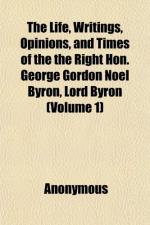|
This section contains 6,990 words (approx. 24 pages at 300 words per page) |

|
SOURCE: "Byron's Don Juan: Myth as Psychodrama," in The Keats-Shelley Journal, Vol. XXIX, 1980, pp. 131-50.
In the essay below, Tate reads Don Juan as a "psychodrama," in which "the poem served the poet as a kind of therapeutic theater in which he could reenact certain of his own problematic amorous adventures."
In his "uncommon want" of a hero, Byron deliberately chose Don Juan as one whose myth satisfied his own needs both as poet and as private man. Examining Byron's poetic reworking of the Don Juan myth in relation to his own psychology yields a reading that lends continuity to a poem still being termed a "hold-all." The myth is descended from Tirso de Molina's El burlador de Sevilla y convidado de piedra (ca. 1616), which combines an account of the amorous adventures of a fictive character whom Tirso named Don Juan, with the Spanish folktale of a stone...
|
This section contains 6,990 words (approx. 24 pages at 300 words per page) |

|


